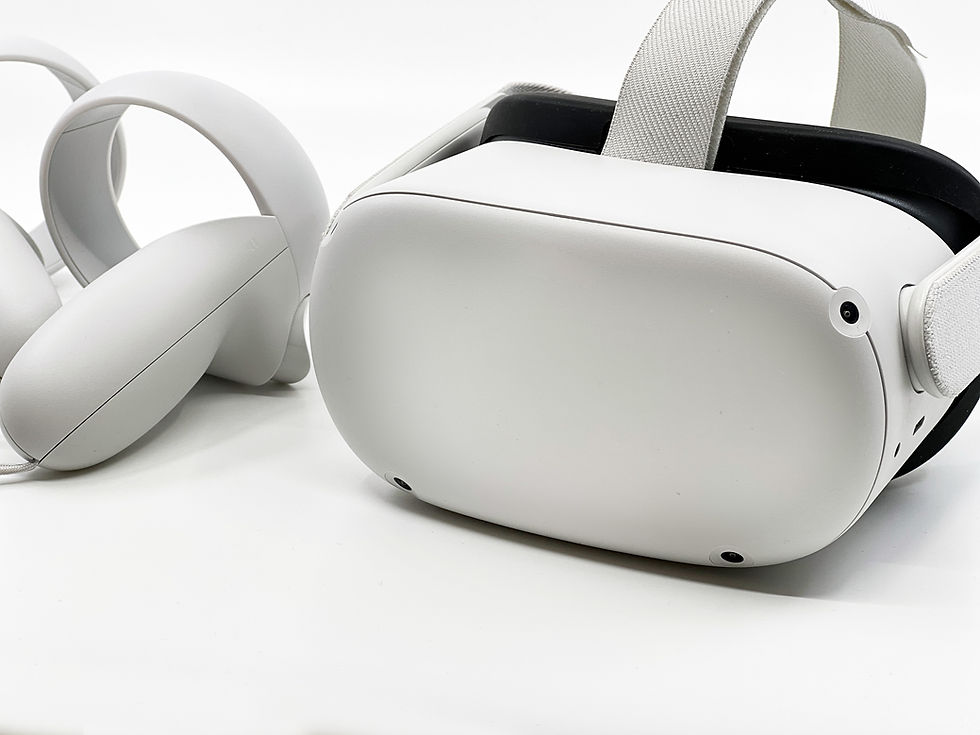Using Virtual Reality to Develop Employability Skills
- Mark Cullens
- Jan 16, 2024
- 5 min read
Updated: Feb 1, 2024
Virtual Reality & Employability Skills
In today's rapidly changing job market, employers are constantly seeking candidates who possess a wide range of employability skills. These skills go beyond technical knowledge and are crucial for success in any career. They include communication, problem-solving, teamwork, adaptability, and more. As technology continues to advance, innovative solutions are emerging to help individuals enhance these skills. Virtual reality (VR) is one such technology that has shown great promise in developing employability skills. In this article, we will explore how virtual reality can be used to cultivate these essential skills, providing a competitive edge in the job market.
Table of Contents

Introduction
Virtual reality is a technology that immerses users in a computer-generated environment, allowing them to interact with and manipulate elements of that environment. VR has gained popularity in gaming and entertainment, but its applications extend far beyond entertainment. Employability skills are highly valued by employers, and VR offers a unique and effective way to develop these skills. Before diving into the various employability skills, let's take a look at three informative YouTube videos that highlight the potential of VR in skill development:
YouTube Video 1: This video showcases real-life examples of individuals using VR for employability skill development.
YouTube Video 2: Explore the ways in which VR is being used in educational institutions to enhance employability skills.
YouTube Video 3: Discover VR simulations that aid in job interview preparation and communication skill improvement.
Now, let's delve deeper into how virtual reality can assist in honing specific employability skills.
Enhancing Communication Skills
Effective communication is a fundamental skill that employers value in candidates. Virtual reality offers a platform where individuals can practice and improve their communication skills in a safe and controlled environment. VR simulations allow users to engage in realistic conversations, presentations, and networking scenarios. This immersive experience helps individuals:
Improve Verbal and Non-verbal Communication: VR simulations enable users to practice both spoken and non-verbal communication cues, such as body language and eye contact.
Receive Immediate Feedback: Users can receive instant feedback on their communication skills, allowing them to identify areas that need improvement.
Overcome Public Speaking Anxiety: Virtual reality offers a risk-free environment to overcome the fear of public speaking, which is a common hurdle in effective communication.
Developing Problem-Solving Abilities
Problem-solving is a critical skill in the workplace, and virtual reality can provide a dynamic platform for enhancing this skill. VR environments can simulate complex problem scenarios, allowing users to:
Tackle Realistic Challenges: Users can solve real-world problems within the virtual environment, gaining practical experience and developing their critical thinking abilities.
Collaborate in Virtual Teams: VR enables users to work together with others in solving problems, fostering teamwork and collaborative problem-solving skills.
Experiment and Innovate: Virtual environments encourage experimentation and
innovation, as users can test various solutions without real-world consequences.
Fostering Teamwork and Collaboration
Teamwork and collaboration are highly valued in most professional settings. Virtual reality can simulate team-based scenarios that help individuals develop these crucial skills. In VR, users can:
Collaborate with Diverse Teams: VR can create scenarios where users work with team members from different backgrounds, enhancing their ability to collaborate with diverse groups.
Practice Conflict Resolution: VR environments can simulate conflicts within teams, providing users with opportunities to practice conflict resolution and negotiation skills.
Build Trust and Cohesion: Through teamwork simulations, individuals can build trust and cohesion within virtual teams, which can translate to improved real-world teamwork.

Adaptability and Innovation
In today's rapidly evolving job market, adaptability and innovation are essential. Virtual reality can expose individuals to dynamic and ever-changing environments, helping them:
Adapt to Unpredictable Situations: VR scenarios can be designed to introduce unexpected challenges, training users to adapt quickly and effectively.
Encourage Creative Thinking: Virtual environments can inspire creative problem-solving, as users are not limited by the constraints of the physical world.
Promote Continuous Learning: VR can facilitate a continuous learning mindset, as users explore new and innovative solutions within the virtual space.
Critical Thinking and Decision-Making
Critical thinking and effective decision-making are indispensable skills in the professional world. VR can present users with complex scenarios that require:
Analytical Thinking: Virtual reality simulations can challenge users to analyze information, evaluate options, and make informed decisions.
Risk Assessment: Users can practice assessing risks and weighing potential outcomes within a controlled VR environment.
Consequence Simulation: VR can illustrate the consequences of decisions, enabling users to learn from their mistakes without real-world repercussions.
Time Management and Organization
Time management and organization skills are often the key to productivity in the workplace. Virtual reality can offer time-bound challenges and tasks, helping individuals:
Prioritize Tasks: VR scenarios can present users with multiple tasks and deadlines, encouraging them to prioritize and manage their time effectively.
Multitasking Practice: Users can develop their multitasking abilities within the virtual environment, preparing them for real-world demands.
Resource Allocation: VR can simulate scenarios where users must allocate resources efficiently, promoting resource management skills.
Creativity and Design Thinking
Creativity and design thinking are becoming increasingly important in various industries. VR provides a creative space where individuals can:
Prototype and Design: Virtual reality can be used for design and prototyping, allowing users to visualize and modify their ideas in a 3D environment.
Visualize Concepts: Users can bring abstract concepts to life within the virtual space, facilitating creative brainstorming and ideation.
Iterate and Refine: VR enables iterative design processes, allowing individuals to refine their creative projects until they meet their objectives.

Frequently Asked Questions
1. How accessible is virtual reality for employability skill development?
Virtual reality technology is becoming more accessible, with a wide range of VR headsets available at various price points. Many educational institutions and training programs are also incorporating VR into their curriculum.
2. Can VR simulations replace real-world experiences?
While VR simulations can provide valuable training and practice, they should complement real-world experiences, not replace them. Real-world experiences remain essential for the development of certain skills.
3. Are there VR applications specific to job interviews?
Yes, some VR applications are designed to simulate job interview scenarios, allowing individuals to practice their interview skills, body language, and responses in a virtual setting.
Now, let's further enrich this article with relevant external and internal links.
For more information on VR applications for employability skills, visit Digital Energy Group.
Explore additional resources on employability skills and virtual reality at Digital Energy Group's blog.
Discover the latest advancements in VR technology on Digital Energy Group's research page.

Virtual reality presents a transformative opportunity for individuals to develop and enhance their employability skills. Whether it's communication, problem-solving, teamwork, or adaptability, VR simulations offer a dynamic and immersive platform for skill development. As the technology continues to evolve, so too will its potential to prepare individuals for success in the ever-changing job market.
Author Bio
Mark Cullens is the founder of Digital Energy Group Ltd and brings 30 years of experience in skills and learning development. Working with VR headsets in the real world of Universities, Local Authorities and Colleges gives him a practical insight into the unique benefits of VR and challenges of using VR for soft skills development. Working closely with Bodyswaps he he provides pre-configured devices with onsite training and support.




Hello - this is a great article, thank you. It's pointed me in the right direction with my thoughts. I'm interested in watching the youtube videos mentioned in the introductions but they don't seem to be links?